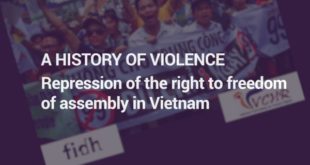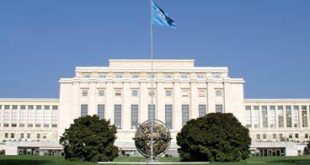TO MEMBERS OF THE UN GENERAL ASSEMBLY
Regarding the Candidacy of Vietnam
at the UN Security Council
Secretary General of the United Nations
H.E. the Heads of Delegations to the United Nations General Assembly
Your Excellencies,
We, the undersigned, are writing to express our deep concern on the forthcoming elections of Non-Permanent Members of the United Nations Security Council for the period 2008-2009 that will take place during the UN General Assembly in New York on 16 October 2007. We understand that the Socialist Republic of Vietnam is candidate for the Asian seat.
The United Nations Security Council is a prestigious institution, one of the “Principal Organs” of the United Nations. The United Nations Charter (Article 23) and the Rules of Procedure of the General Assembly (rule 143) specify that the criteria for electing members to serve on the Security Council should be: “the contribution of Members of the United Nations to the maintenance of international peace and security and to the other purposes of the Organization…”. On both these accounts, Vietnam is ineligible for this seat.
The minimal obligation of UN member states is to uphold the principles enshrined in the UN Charter, and comply with international human rights standards and norms. Countries aspiring to become members of the UN Security Council have a special responsibility to fulfil these binding obligations.
Whilst Vietnam acceded to the International Covenant on Civil and Political Rights (ICCPR) and the International Covenant on Economic, Social and Cultural Rights (ICESCR) in 1982, it gravely violates the provisions of these treaties, and refuses all dialogue with UN human rights mechanisms. Its periodic report on the ICESCR is overdue since 1993. It ignores requests from the Special Rapporteurs to visit Vietnam. Indeed, it has allowed no visits since 1998, when the Special Rapporteur on Religious Intolerance criticized Vietnam’s religious freedom record during an in situ visit. Blatantly rejecting its international obligations, Vietnam announced it would never again “accept any individuals or organizations coming to investigate religious freedom or human rights”.
Despite urgent and repeated recommendations by the UN Human Rights Committee (2002), the Special Rapporteur on Religious Intolerance (1998) and the UN Working Group on Arbitrary Detention (1994), Vietnam continues to detain citizens under vaguely-defined “national security” provisions in the Criminal Code that are totally incompatible with the ICCPR. These provisions, which make no distinction between violent acts such as terrorism and the peaceful exercise of freedom of expression, carry extremely heavy prison sentences. Seven of them incur the death penalty. Including such vague offences as “undermining national solidarity”, “sowing divisions between religious and non-religious people”, (article 87) “abusing democratic freedoms to encroach on the interests of the state” (article 258), they effectively criminalize the peaceful exercise of human rights.
This year, in a brutal crackdown on dissent, Vietnam invoked these “national security” provisions to arrest and detain scores of human rights defenders, religious followers, democracy activists, cyber-dissidents, journalists and trades unionists simply for circulating petitions on democracy or calling for human rights. In a wave of unfair trials between March and May 2007, 20 pro-democracy activists were sentenced to a total of 80 years in prison and 30 years house arrest for their peaceful activities.
Not only peaceful critics and democracy activists, but also peasants and farmers are suffering severe Police repression, arrests and detention in Vietnam today simply for staging peaceful protests against official power abuse, corruption and State confiscation of land. Known as the “Victims of Injustice”, these hundreds of thousands of peasants and farmers, expropriated by the State with little or no compensation, march from the rural areas to file complaints and demonstrate outside government buildings in Hanoi and Ho Chi Minh City. This movement of rural discontent began some 20 years ago, and has reached explosive proportions today. In Vietnam, farmers and peasants represent 74% of the 83-million population, and 75% of its total work force of 45 million people. Official figures record over 2 million complaints filed in the past 10 years. Instead of seeking to solve their problems, Vietnam adopted Decree 38/2005 banning demonstrations outside public buildings, and subjects the protesters to routine harassment and arrest.
Simply for seeking to succour these “Victims of Injustice”, prominent Buddhist dissident Thich Quang Do, Deputy leader of the outlawed Unified Buddhist Church of Vietnam and 2007 Nobel Peace nominee faces imminent arrest today. In July 2007, he launched a humanitarian appeal and visited farmers demonstrating in Ho Chi Minh City to express his solidarity and distribute relief aid. For this “crime”, Vietnam has launched a virulent slander campaign against Thich Quang Do in the state-controlled media, accusing him and the UBCV of “inciting people to demonstrate” and “disturbing public order”. These are ominous charges in Vietnam, and we fear they are a prelude to a crackdown. They are also a grave violation of Vietnam’s domestic laws (Article 71 of Constitution formally prohibits “all violation of the honour and dignity of a citizen”). Thich Quang Do, who is currently under house arrest without charge at the Thanh Minh Zen Monastery in Ho Chi Minh City, has spent 26 years in detention for his peaceful advocacy of religious freedom, democracy and human rights.
Your Excellencies,
We believe that international peace and security cannot be maintained by a government who creates insecurity at home by using violence and repression to suppress its citizens’ peaceful aspirations and legitimate rights.
We therefore call upon you not to vote for Vietnam as a Non-Permanent member of the United Nations’ Security Council, and select another Asian candidate for this seat. Vietnam should not be elected to serve on the Security Council unless it makes a formal pledge, within an established time frame, to take the following steps;
Ø immediately release all persons detained for the peaceful exercise of their legitimate right to freedom of expression, religion, assembly and association, in particular the UBCV Patriarch Thich Huyen Quang, Thich Quang Do, Father Nguyen Van Ly, Nguyen Van Dai and Le Thi Cong Nhan;
Ø re-establish the legitimate status of the outlawed Unified Buddhist Church of Vietnam and cease repression against members of all non-recognized religious communities such as the Buddhists, Hoa Hao, Cao Dai and Protestants;
Ø implement the recommendations of UN Human Rights Committee (July 2002) by revising “national security” provisions in the Criminal Code and repealing all legislation that curbs the exercise of human rights; immediately repeal Ordinance 44 on administrative detention which empowers Security Police to detain dissidents without trial for up to two years or intern them in psychiatric institutions;
Ø comply fully with UN human rights mechanisms, beginning with extending a standing invitation to the Special Rapporteur on Freedom of Expression, the Special Rapporteur on Religious Freedom and the Working Group on Arbitrary Detention to make in situ visits to Vietnam;
Ø abolish the death penalty in Vietnam.
Sincerely,
Nina Shea, Director, Center for Religious Freedom, The Hudson Institute, Commissioner, US Commission on International Religious Freedom; Theodore Piccone, Executive Director, Democracy Coalition Project; Richard Rowson, President, Council for a Community of Democracies; Morton H. Halperin, Open Society Institute; Vo Van Ai, President, Quê Me: Action for Democracy in Vietnam; Arne Liljedahl Lynngård, Chairman, Rafto Foundation, Norway; Roel Von Meijenfeldt, Executive Director, Netherlands Institute for Multi-Party Democracy; Oumar Makalou, Executive Secretariat, Non-governmental Process of the Community of Democracies, Mali; Jennifer Windsor, Executive Director, Freedom House; Marco Pannella, Member of Parliament, Italy; Marco Cappato, Member of Parliament, Italy; Donatella Poretti, Member of Parliament, Italy; Bruno Mellano, Member of Parliament, Italy, Marco Beltrandi, Member of Parliament, Italy; Maurizio Turco, Member of Parliament, Italy, Sergio D’Elia, Member of Parliament, Italy; Ilona Mihaies, Executive Director, Euroregional Center for Democracy, Romania; Hannah Forster, Director, African Center for Democracy and Human Rights, Gambia; Dieudonné Zognong, Director, Humanus Foundation, Cameroon; Robert LaGamma, Executive Director, Council for a Community of Democracies; Han Dong Fang, Director, China Labour Bulletin, Hong Kong; Xiao Qiang, Director, China Internet Project; Urgen Tenzin, Director, Tibetan Centre for Human Rights and Democracy, Dharamsala; Weng-chen Lin, President, Taiwan Foundation for Democracy; Debbie Stothard, Steering Committee, World Forum for Democratization in Asia; Khin Ohmar, Director, Network for Democracy and Development (Burma); Dolkun Isa, World Uyghur Congress; Somchai Homalor, Coalition for the Protection of Human Rights Defenders, Thailand; Chee Siok Chin, Executive Director, Alliance for Reform and Democracy in Asia, Singapore; Matteo Meccaci, Vice-President of the Senate, Non-violent Radical Party, Transnational and Transparty, Italy; Bo Tedards, Coordinator, World Forum for Democratization in Asia; Augusto Miclat, Executive Director, Initiatives for International Dialogue, Philippines; Yap Swee Seng, Executive Director, SUARAM, Malaysia; Attorney Florencio B. Abad, Vice-President, Liberal Party of the Philippines; Tian Chua, People’s Justice Party, Malaysia; Zanaa Jurmed, Director, Center for Citizens Alliance, Mongolia; Dr. Paul Scott, Professor, Asian Studies Program, Kansai Gaidao University, Japan; Dr. Ash Narain Roy, Institute of Social Sciences, India; Sarwar Bari, Chairperson, Pattan Development Organization, Pakistan; Subodh Raj Pyakurel, Chairperson, Informal Sector Service Centre, Nepal; Chalida Tajaroensuk, Coordinator, People’s Empowerment, Thailand; Dr. Hong Seong-phil, Director, Citizens’ Alliance for North Korean Human Rights; Joseph Yu-shek Cheng, Professor of Political Science, City University of Hong Kong; Sheng Xua, Vice-President, Federation for a Democratic China; Mani Sinhbandith, United Lao Action Center; M. Ravi, Human Rights Lawyer, Singapore; Venerable Katsuyuki Imoto, Catuddisa Sangha, Japan; Venerable Dim Chetta, Catuddisa Sangha, Cambodia; Venerable Thich Vien Ly, Secretary General, Vietnamese American Unified Buddhist Congress in the USA; Venerable Thich Giac Dang, USA-Vietnam Theravada Buddhist Sangha; Luie Guia, Libertas, Philippines; Sareme Sundara, Lao Fund; Lambert Ramirez, National Institute for Policy Studies, Philippines; Tsung Li Yang, Taiwan Youth Democracy Association; Kok Ksor, President, Scott Johnson, Y Duen, Montagnard Foundation Inc.; Kh. Naranjargal, President, Globe International, Mongolia; Young Howard, Director, Open Radio for North Korea; Schu Sugawara, Chairperson, International Committee, Japan Congress of Journalists; Dr. Jarmila Ballaho-Balamo, Women’s Organization of Basilan, Philippines; Prof. Octavio A. Dinampo, Tulung Lupah Sug, Philippines; Dr. Samsula J. Adju, Sakayan Mindanao, Inc., Philippines; Maria A. Caber, Teachers Dignity Coalition, Philippines; Benjamin Reilly, Australian National University; Steve Buttel, Human Rights Without Frontiers, South East Asia; Penelope Faulkner, Vice-President, Vietnam Committee on Human Rights.
 Quê Me Quê Me: Action for democracy in Vietnam & Vietnam Committee on Human Rights
Quê Me Quê Me: Action for democracy in Vietnam & Vietnam Committee on Human Rights



